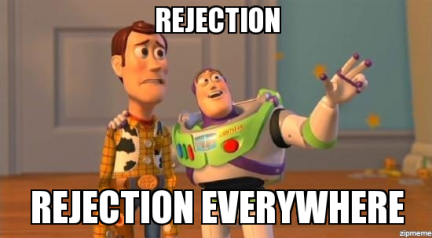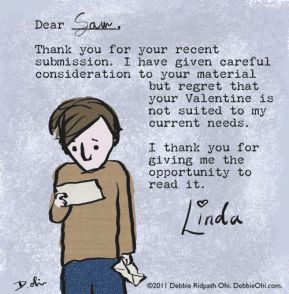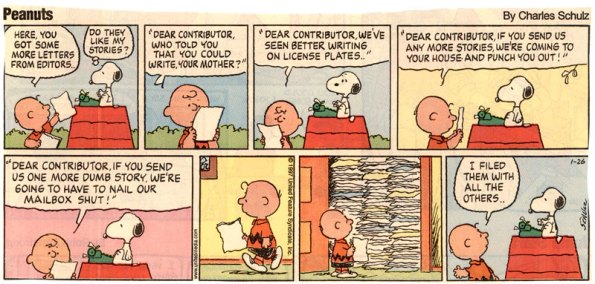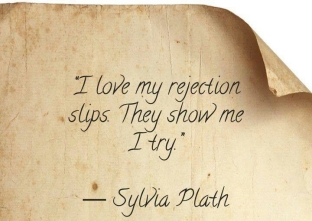Rejection
Not a pleasant word.
Just look at the synonyms: denial, refusal, exclusion, repudiation, dismissal, rebuff.
And then in more colloquial terms: turndown, cold shoulder, brush off, kick in the teeth, slap in the face, thumbs down, nothing doing.
Ah, yes. Kick in the teeth. That pretty much sums it up.
And then look at the official definition (Oxford Dictionary)
- The dismissing or refusing of a proposal, idea, etc.
Not so bad. Not so personal.
But then, this:
- The action of spurning a person’s affections.
Ouch. Much worse. About as personal as it gets.
I would say that writerly rejection falls somewhere between those two camps – the dismissing of an idea, yes – but the dismissing of MY idea – and the suggestion that someone else’s idea is better than mine and therefore, they are better at having ideas than I am. I am not a good ideas person. I am not a good person. Even worse, I am a bad writer. And WHY IS EVERYONE REJECTING ME?
*Ahem*…. Just me?
Either way, the dictionary defines it as an act – but it doesn’t take much to turn it into a rather over-whelming and very, VERY personal feeling.
 No wonder why we fear it so much. We fear it in our jobs, our relationships, our social status, and even on the internet (ever been ‘unfriended’ or ‘unfollowed’?). No wonder we try to avoid it – if we can.
No wonder why we fear it so much. We fear it in our jobs, our relationships, our social status, and even on the internet (ever been ‘unfriended’ or ‘unfollowed’?). No wonder we try to avoid it – if we can.
And here is the problem with those who work – or, more precisely, are trying to have some small glimmer of success – in the creative industries: rejection is inevitable. It’s going to happen. For the luckiest ones, it will happen for a short while and then suddenly there will be that wonderful antonym of our soul’s worse fear: acceptance! A foot in the door, an opportunity to prove your talent. That’s all any of us really want, isn’t it?
For the majority, however, it will be one soul-crushing rebuff, refusal, and repudiation after another. In theory, it’s the idea, proposal or work that is being rejected, not the person. Employers, for example, haven’t even met you before they decide whether to give you an interview or not. Their decision is mostly influenced by the appeal of the other candidates – perhaps someone happened to have experience in an area that you didn’t. Or (apologies for the cynicism) perhaps the other person was just that bit cheaper. It’s not you they are rejecting – just your C.V.
It’s not personal.
Or is it?
Because after a while, it starts to feel like it is.
‘WHAT’S WRONG WITH ME?’ you cry.
And if you’re me, you literally cry – ugly, snotty-face-cry – into a pillow or sharing-size packet of crisps.
Maintaining a positive, objective perspective on rejection is hard. It’s hard for anyone, any time, in any circumstance. 
But it feels even worse if you’re a writer, musician, actor, dancer etc. I can’t imagine the level of rejection experienced by anyone who has to actually physically leave the house in order to be rejected. You must have to develop a very thick skin and highly elevated self-esteem to get over the rejections of numerous auditions. At least as a writer you get rejected in the safety of your own home and via an electronic device or letter (do people still do letters now?). No matter how hard you try to keep hold of that rational, objective perspective, it does feel that your affections are being spurned rather than simply the premise of your book. Especially if you are particularly fond of your work and have poured all of your affections into its creation…
There is a plus side though.
Really there is.
I’m not being sarcastic.
Here are the positives:
1. If you’re going to get rejected at all, you can’t be rejected in a nicer way than by a literary agent.
They’re lovely.
 I open most email responses from literary agents with one eye shut and skim quickly for the line beginning ‘Unfortunately…’. But once I’ve abruptly closed the email, digested the news, had five chocolate biscuits and then re-opened the response, I generally find a rather sweet, kind message – sincerely apologetic and encouraging.
I open most email responses from literary agents with one eye shut and skim quickly for the line beginning ‘Unfortunately…’. But once I’ve abruptly closed the email, digested the news, had five chocolate biscuits and then re-opened the response, I generally find a rather sweet, kind message – sincerely apologetic and encouraging.
For example:
‘Thank you for giving the [NAME OF AGENCY] a chance to consider your work. And for your patience in waiting for a reply. Unfortunately [TITLE OF WORK] is not right for us. The result is that we have to be incredibly selective, so please do not be too disheartened. Another agent may well feel differently. We wish you the very best of luck in the future.’
Or
Thank you for sending us your work, which we have read with interest. Although we did enjoy looking at your material, in the end we felt it wasn’t quite right for [NAME OF AGENCY]. We have to feel absolutely passionate about a new project before taking it on and we didn’t feel strongly enough in this case. Please do not be discouraged by our response and we hope you find an agent with the right amount of enthusiasm for your work. We’d also like to thank you for thinking of [NAME OF AGENCY].
Or this:
‘Thank you for sending us your work and for your patience in waiting to hear from us, we really appreciate this. We have read this submission with great interest, but we are really sorry to say that we are not able to offer you representation for this work. We very much enjoyed your writing style and the characters that you created, but unfortunately we didn’t fall in love with the story in the way that we would need to. As we are receiving a very large number of submissions at the moment, we have to be extremely selective with the work that we choose to represent. We apologise for the disappointing response and as this is such a subjective industry we would strongly recommend that you send your work to as many other agencies as possible. We wish you every success with your writing.’
Yes, I still feel crap for about an hour afterwards (this is progress – used to be days – got it down to about an hour of self-pitying – aiming for ten minutes eventually), but I also feel someone has shown me some compassion and empathy. They know what it is to be rejected and have tried to soften the blow a little. I actually well-up a little looking back on them – with a genuine feeling of gratitude and fondness that someone didn’t just stamp on my heart, laugh in my face and tell me ‘never to darken their inbox with such a load of trite ever again’. Not that a professional would say such a thing these days, I’m sure…?

Errr…
Anyway – the general tone of these emails restores my faith in humanity a little. And my faith in myself. And my book. Which is important, because you’ve got to have faith in your book to get back up on the computer, click the ‘compose new message’ button and try again. And again. And again. And again…
So, thank you, literary agents everywhere, for your rejections. They are the nicest I could ever hope to receive. Honestly.
 2. Every rejection is evidence that you tried.
2. Every rejection is evidence that you tried.
I’m pretty sure there’s only one feeling that is worse than rejection – and that’s regret. And I have a whole catalogue of rejection that I will NEVER regret.
3. Every rejection is one rejection closer to an acceptance.
Sending out submissions is a bit like setting your book up on lots of dates. It will certainly never fnd THE ONE sitting at home feeling sorry for itself. One day, someone, somewhere, will love your book as much as you do. Probably.
Who knows..? Only those who DON’T GIVE UP.

